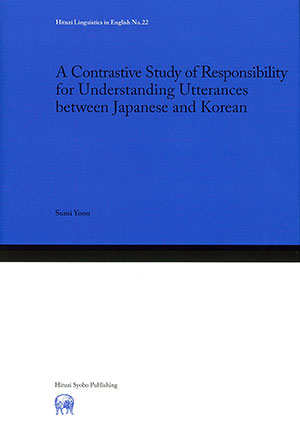A Contrastive Study of Responsibility for Understanding Utterances between Japanese and Korean
尹秀美著
2014年2月
 |
Hituzi Linguistics in English No.22
A Contrastive Study of Responsibility for Understanding Utterances between Japanese and Korean
尹秀美著 Sumi Yoon
菊判上製 定価8,400円+税
ISBN 978-4-89476-685-3
ひつじ書房
|
日本語と韓国語は語彙、語順、敬語など文法面での類似点が多いため、会話レベルでも両言語は同じような振る舞いをすると思いがちである。事実、ハインズは、発話理解の責任主体という観点から英語は話し手責任、日本語と韓国語は聞き手責任の言語だと主張している。しかし、本書では、対応する場面で用いられる日本語と韓国語の具体的な発話データに基づいて、韓国語は、日本語と異なり、話し手責任の言語であることを例証する。
Contents
Acknowledgements
List of abbreviations
Chapter 1 Introduction
1.1 Motives of the Book
1.2 Aims of the Research
1.3 Outline of this Book
Chapter 2 Theoretical Background and Previous Studies
2.1 General Account
2.2 Individualizing Language Typology
2.3 Writer/Speaker-Responsible and Reader/Listener-Responsible
Languages
2.3.1 John Hinds’ Theory
2.3.2 Studies Inspired by Hinds’ Theory
2.4 Japanese and Korean Written Discourse in Rhetoric
2.4.1 Japanese and English
2.4.2 Korean and English
2.4.3 Japanese and Korean
2.5 Contrastive Discourse Studies between Japanese and Korean
2.5.1 Apologies
2.5.2 Requests
2.6 Pilot Study
2.7 Research Questions
2.8 Hypothesis
Chapter 3 Methodology
3.1 General Account
3.2 Experimental Design of Conversation Situations
3.3 Participants
3.3.1 University Students
3.3.1.1 Japanese and Korean University Students
Who Live in Their Own Countries
3.3.1.2 Japanese and Korean University Students
Who Live in the United States of America
3.3.2 Office Workers
3.4 Methods
3.4.1 University Students
3.4.1.1 Apologies
3.4.1.2 Requests
3.4.2 Office Workers
3.4.2.1 Apologies
3.4.2.2 Requests
3.5 Data Analysis
3.5.1 Quantitative Analysis
3.5.2 Qualitative Analysis
Chapter 4 Apology Discourse by Japanese and Korean
University Students
4.1 General Account
4.2 Introduction
4.3 Data Analysis
4.4 Results
4.4.1 The First Turn of Apologetic Discourse
4.4.2 The Second Turn of Apologetic Discourse
4.4.3 The Third Turn of Apologetic Discourse
4.5 Discussion
4.5.1 Explanations for Apology Preferred by Korean Students
4.5.2 Expressions of Apology and Thanks
4.5.3 Influence of Daily Use of English in Responsibility for
Understanding Utterances
4.6 Conclusions
Chapter 5 Request Discourse by Japanese and Korean
University Students
5.1 General Account
5.2 Introduction
5.3 Data Analysis
5.4 Results
5.4.1 The First Turn of Request-type Discourse
5.4.2 The Second Turn of Request-type Discourse
5.5 Discussion
5.6 Conclusions
Chapter 6 Apology Discourse by Japanese and Korean Office
Workers
6.1 General Account
6.2 Introduction
6.3 Data Analysis
6.4 Results
6.4.1 Comparison between Japanese and Korean Office Workers
6.4.2 Comparison between Japanese Female and
Male Office Workers
6.4.3 Comparison between Korean Female and
Male Office Workers
6.5 Discussion
6.5.1 Difference of Total Amount of Information by Japanese and
Korean Office Workers
6.5.2 Correlation between the Total Amount of Information and the
Relationship between the Speaker and Listener
6.5.3 Correlation between Total Amount of Information and
Speaker’s Gender
6.6 Conclusions
Chapter 7 Request Discourse by Japanese and Korean Office
Workers
7.1 General Account
7.2 Introduction
7.3 Data Analysis
7.4 Results
7.4.1 Total Amount of Information by Japanese and Korean in
Requests
7.4.1.1 Comparison between Japanese and Korean Office
Workers
7.4.1.2 Comparison between Japanese Female and
Male Office Workers
7.4.1.3 Comparison between Korean Female and
Male Office Workers
7.4.2 Sentence Types of Utterances in Requests between Japanese
and Korean
7.5 Discussion
7.6 Conclusions
Chapter 8 Conclusions
References
Appendices
Index
|
著者紹介
尹 秀美(ユン スゥミ)
金沢大学大学院人間社会環境研究科博士課程修了。博士(文学)。
現在、金沢大学男女共同参画キャリアデザインラボラトリー博士研究員、金沢大学非常勤講師(朝鮮語担当)。
|
|
ご注文は、最寄りの書店さんでお願いします。
お店に在庫が無くても、お取り寄せができます。
書店が最寄りにない場合は、オンライン書店でご注文ください。




お急ぎの場合は、小社あてにご注文いただくこともできます。
郵便番号、ご住所、お吊前、お電話番号をメールか、FAXでお知らせください。
送料432円でお送りします。

